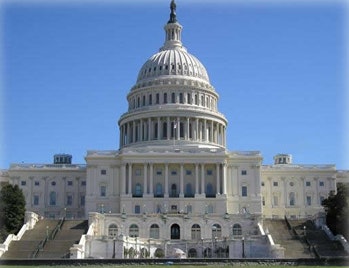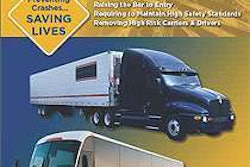
The U.S. House of Representatives and the U.S. Senate on Tuesday, May 8, went to conference on their respective transportation bills – S 1813, which passed the Senate in March, and HR 4348, a 90-day extension of the current program, along with a handful of other policy provisions, including the Keystone pipeline language as well as environmental streamlining language, which passed in April.
The Commercial Vehicle Safety Alliance said House leaders are using the extension as a “shell” bill in order to have something germane to conference with S 1813, but that the path forward is unclear and could take weeks, even months, to negotiate. While the House and Senate pass bills that are similar in length and scope, the House transportation bill addresses practically none of the policy included in the Senate bill.
CVSA said the House in a much weaker negotiating position than the Senate, which raises questions on what will happen to House proposals in the defunct HR 7 that do not have some version of a counterpart in the Senate bill. While it remains possible that a bill could be passed before the election, many observers still believe the odds are slim, according to CVSA.
The inclusion of the environmental policy and the Keystone Pipeline, both of which drew veto threats from the White House, indicate that conference could be difficult. CVSA said it’s hard to see the conferees coming up with something that will get the necessary votes in the House unless those votes come from the Democrats, but it is unlikely that House leadership will want to move a bill that only will pass with Democrat support.
The Truck Rental and Leasing Association on Tuesday, May 8, urged Congress to extend expiring tax incentives aimed at accelerating the production of natural gas resources and the utilization of natural gas as a transportation fuel. In written testimony before the House of Representatives’ Committee on Ways and Means, TRALA supported the tax incentives as a factor in boosting domestic job production and reducing dependence on foreign oil.
The tax incentives supported by TRALA in its testimony included tax credits and rebates for fuel production, fuel purchases, infrastructure development and vehicle purchases. These tax incentives already have been in place for several years but either have expired recently or are set to expire at the end of 2012. TRALA urged Congress to consider extending these tax incentives in order to help mitigate the cost increases associated with the early utilization of natural gas as an alternative transportation fuel.
In addition to economic and energy security issues, TRALA also focused on the potential environmental benefit of extending the tax incentives. In its testimony, TRALA explained to the committee the upfront costs of purchasing equipment and technology needed to switch to using natural gas as a transportation fuel, and that the mitigation of some of these costs through extending the tax incentives will prevent delays in achieving the environmental benefits of natural gas fuels.
“As TRALA members and their motor carrier customers explore the benefits of operating natural gas-powered trucks, Congress should do what it can to keep natural gas as a viable alternative in meeting our country’s economic, environmental and energy security goals,” said Tom James, TRALA president and chief executive officer.











